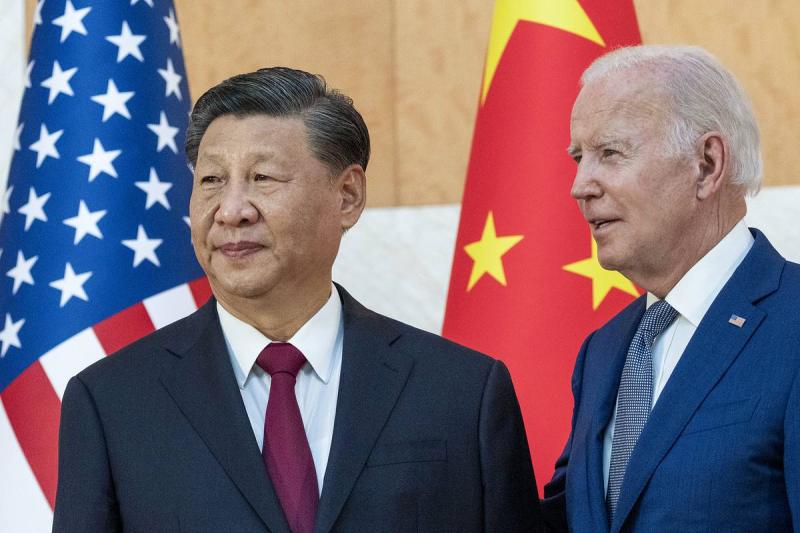
© AP Photo/ Alex Brandon/TASS
Negotiations between Pentagon head Lloyd Austin and Chinese Defense Minister Li Shangfu are likely to fall through over US-imposed sanctions against the latter, Britain’s The Financial Times (FT) reports, citing sources. It will be next to impossible for the Chinese authorities to agree to such a meeting until these restrictions remain in force.
The Pentagon, meanwhile, declares its wish to establish "open lines of communication" with the PRC’s military leadership, claiming that Beijing ignores or rejects "multiple US requests for senior-level communication," the newspaper informs. The United States assured Beijing that sanctions against Li Shangfu were hardly an obstacle to his meeting with Austin in a third country. FT sources also state there is no prospect of lifting the Biden administration’s sanctions against the Chinese minister.
Just a reminder: 2018 saw the US Treasury introduce restrictions against China’s Training and Administration Department of the Central Military Commission and its then head Li Shangfu. Analysts tend to believe this may hamper highest-level military contacts between Washington and Beijing, at least in the short term.
Despite this, as Bloomberg reported the other day, the United States keeps working to arrange the Pentagon chief’s meeting with his Chinese counterpart in Singapore this summer. The proposed negotiations may take place at the Shangri-La Dialogue regional security forum (June 2 to 4) to be attended by military leaders of 28 APR states. China is sure such a meeting is unlikely, which Beijing has already notified Washington of. By the way, last year’s forum featured Lloyd Austin’s meeting with Li Shangfu's predecessor Gen. Wei Fenghe, but the latter has not been sanctioned by the US, so it is another matter altogether.
Notably, Beijing is tightening its stance both along the military and the diplomatic track. For instance, China still rejects Washington's attempts to resume any high-level contacts, Politico writes, citing sources. American officials say Beijing does not support the appointment of a new date for US Secretary of State Anthony Blinken’s visit to the PRC canceled back in February over the spy balloon incident. America is sure it was on a reconnaissance mission, while the Chinese keep claiming it was a civilian weather balloon that went off course.
Back then, this story caused a real stir and made Blinken call off his trip to Beijing, which insulted and irritated China, and this is how things stand today as well. Apparently, for this very reason official Beijing has declined requests to have other US officials visit the country, as well as arrange a telephone conversation between US President Joe Biden and Chinese President Xi Jinping. Thus, the Chinese Foreign Ministry made it clear that Beijing is in no hurry to put the two leaders through. "Communication should not be carried out for the sake of communication," official spokesman Wang Wenbin explained.
Beijing's reluctance to restore diplomatic ties with Washington has all the more intensified following Taiwanese leader Tsai Ing-wen’s recent trip to the United States to meet with high-ranking officials. The situation around Taiwan aggravated with last year’s visit to the island of US ex-House speaker Nancy Pelosi. China condemned the incident as a manifestation of Washington's support for Taiwanese separatism, and conducted large-scale military exercises off the island’s coast. Since then, tensions between the two countries have only been on the rise.
Moreover, Beijing's current rejection of constant high-level interaction underscores the particularly tense nature of US-Chinese relations over the past few months. "What was a two-sided desire to stabilize an increasingly volatile relationship is becoming much more about Washington reaching out and the Chinese government demurring," Politico points out. "Beijing is increasingly resentful about U.S. arms sales to Taiwan and official contacts that China says encourage Taiwan’s pro-independence elements."
Apparently, China is piling pressure both on the United States and the entire West. Suffice it to say that the Chinese Foreign Ministry recently declared Consulate General of Canada in Shanghai Jennifer Lynn Lalonde persona non grata after a diplomat was expelled from China’s Consulate General in Toronto. The scandal broke out with Canadian intelligence accusing Chinese diplomat Zhao Wei of intimidating a Canadian MP of Chinese origin. "China reserves the right to make further reactions" in case of conflict escalation, the Chinese Foreign Ministry warned.
China's tough response to Ottawa was brought about by the same determination as regards its ties with the United States and the EU. So, Chinese Foreign Minister Qin Gang, having met with US Ambassador to Beijing Nicholas Burns on May 8 before his trip to Europe to visit Germany, France and Norway, said the US had lost its chance to smooth relations with Beijing after their leaders met at last year’s G20 summit in Bali. Beijing also warned the EU against imposing sanctions against Chinese companies cooperating with Russia.
In conclusion, let’s note that the March visit by Chinese Leader Xi Jinping to Moscow and his talks with Russian President Vladimir Putin shook the ghost into Western countries, primarily the USA. A clear proof of that is a recent statement by head of the Joint Chiefs of Staff Gen. Mark Milley, who urged to ramp down rhetoric about the war with China that is pushing Beijing into strengthening its military power and rapprochement with Russia. In turn, the Chinese Ministry of Defense announced readiness to boost military cooperation with Moscow. In this situation, Gen. Milley suggests not to push China and Russia into each other's arms and follow the old rule set by 26th US President Theodore Roosevelt: "speak softly and carry a big stick."
Whether this "big stick" is helpful to America or not, the fact of closer across-the-board cooperation between Moscow and Beijing is an obvious thing, giving China courage and resolve against the West. Russia is always ready to give a hand to its Chinese friend.









